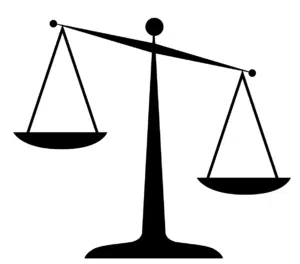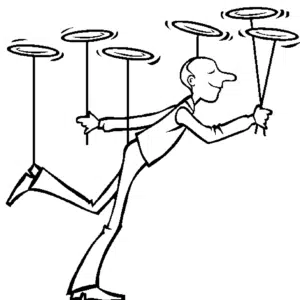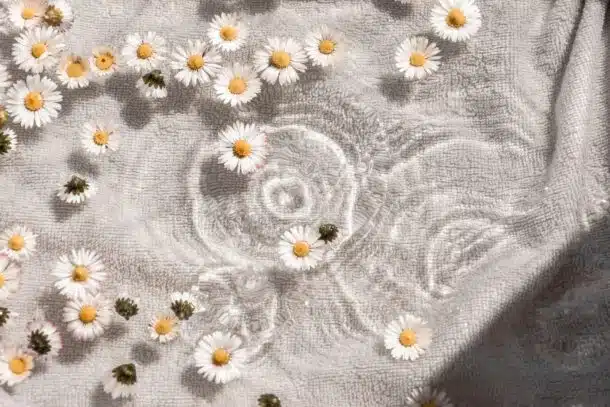In Traditional Chinese Medicine, there are five natural elements that exist within us, just as they do in nature. Each season belongs to a particular element and has unique correspondences. When we study nature’s patterns, we can learn how to support our own health and stay well year-round.
Equilibrium or Balance
The western visual for equilibrium can be represented as a set of scales where one side balances out the other side. This suggests that if we keep everything the same and balanced equally on both sides of the scale, life will remain balanced and in equilibrium and we remain healthy and in balance.
However, the reality of life is not that simple and if everything remained the same, life would become rigid and stagnant. A good example is if you stand, holding a pose and someone comes along and pushes you – your balance (equilibrium) will be thrown off. If a tree stands still and stops growing, it will become stiff and rigid. The branches would die and fall off and the wind will eventually blow them over. A tree must adjust and change throughout the seasons and years. Their roots must grow deeper to support the ever-increasing foliage that feeds the growing trunk. It’s a full cycle of change, growth, and hibernation. Even though death is inevitable, we want to prolong a healthy life to enjoy ourselves until that day draws near.
Equilibrium or balance (from a health perspective) should be viewed more like balancing a plate on a stick – the plate must be in motion to continue to balance. If you imagine dividing the plate into 5 sections, representing the 5 elements, you can see how each section contributes to the next section to keep the plate balancing on the stick. Or maybe you might want to hold the plate in one hand, with your fingers spread evenly to take the weight of the plate. Then imagine each finger representing one of the 5 elements. If you pull one finger away, the plate will fall to one side ruining the equilibrium and causing disease.
In Traditional Chinese Medicine, we look at all 5 areas, not just one side being too heavy or too light, but any of the 5 areas that could be out of balance. The aim is to diagnose and treat the elements that may be in excess or deficiency. In Acupuncture, we diagnose by reading the pulse, tongue, body composition, symptoms, and environmental factors such as diet, lifestyle, family dynamics, work dynamics, etc.
Season of Winter
Each element is associated with a different emotion, season, taste, organ, and even time of day. We are currently in the middle of winter, where the prominent element is water. This means that if we have disharmonies related to a deficiency in water – they will worsen or present themselves at this time of year. The flip side about winter is that it is the best time to treat such imbalances because water is strongest at this time. These problems are brought to the surface, into our awareness, and we can treat them appropriately. A simple example of this might be hydration. If we are dehydrated in the summer, we may find ourselves needing to drink a substantial amount of water to feel hydrated and may not ever feel completely satiated. However, it takes a lower consumption of water in the wintertime to regain that feeling of being hydrated. Other water-related symptoms could be dry nails, dry lips and skin, arthritis, back or knee pain, tinnitus, and any age-related issues such as menopause, infertility, or degenerative diseases. Some more acute problems may include UTIs, pain from kidney stones, and anything that affects the waterways of our body.
| Element | Organs | Season | Sense Organ | Flavour | Tissue | Environment | Personality |
| Water | Kidney, Urinary Bladder | Winter | Ear | Salty | Bone | Cold | Philosopher, loyal but few friends |
The corresponding organ to the water element is the kidney and bladder whilst the corresponding tissue is bone and marrow. The sense organ is the ear and the emotion for water is fear. The corresponding flavor is salty which scientifically makes sense as salt attracts water molecules and they bond so strongly on a molecular level.
It can be a good idea to eat certain foods at this time of year. Eating seasonally and purchasing foods from quality stores or farmers’ markets is one way to ensure that you’re eating foods that are in season. The colour of water is black/dark blue so these coloured foods will be nourishing at this time of year.
As bone is the corresponding tissue of the water element – consuming bone broths and vegetable broths will be tonifying. Omega 3’s have been shown to improve joint health so consuming foods high in omega 3’s will be beneficial to our bone health. Kidney-shaped foods will also be beneficial such as kidney beans, broad beans, peanuts and Brazil nuts. Dark coloured foods such as dark whole grains, dark beans, dark green vegetables and dark purple vegetables. Well-cooked foods such as stews and soups are cooked in plenty of water – further nourishing the water element.
Lifestyle
The behavior of the water element moves downward and tend to puddle in low-lying areas. If a vessel is not properly sealed, the water will eventually move its way down. This can be reflected in how we should behave during winter – laying low in a calm and relaxed manner. Water is not contained well if it is vigorously shaken or moved, but it also should not be pooling in areas for a long time as it will become stagnant, murky, and full of disease. It is important that we exercise enough but less than we would in summer. The best types of exercise in winter are gentle activities like yoga, qi gong, tai chi, or walking. The key is to concentrate on breath work and methodical movements – not trying to reach our personal bests. The five-element theory of water is philosophical, truthfulness, and knowledge so winter can be a great time of year to wind down, read, and enjoy art and music.
Lastly, if water becomes too cold, it turns to ice and no longer flows. We want to prevent this stagnation by keeping warm, especially around the area of the kidney and bladder (feet, knees, lower back, and lower abdomen.) Alternatively, if water gets too hot, it turns to steam and the flow becomes too unpredictable, beginning to disappear and causing a deficiency of water. TCM theory suggests limiting any activities that cause too much sweat at this time of the year and avoiding too much heating in the home or in the office. It is far better to be slightly cool but well covered and warm, rather than cold or too hot.
Our corresponding organ to the water element is the kidneys. Our kidneys are nourished with sleep and rest so try to get a little more sleep in winter and you’ll be grateful when spring comes around. Some people might suffer seasonal depression, which can be worsened in winter so it is important to try and embrace the quietness and solitude at this time of the year – connecting with those who we have deep and loving relationships with. If your loved ones are doing winter properly, they will also be craving deep conversation and quality time spent with each other.





